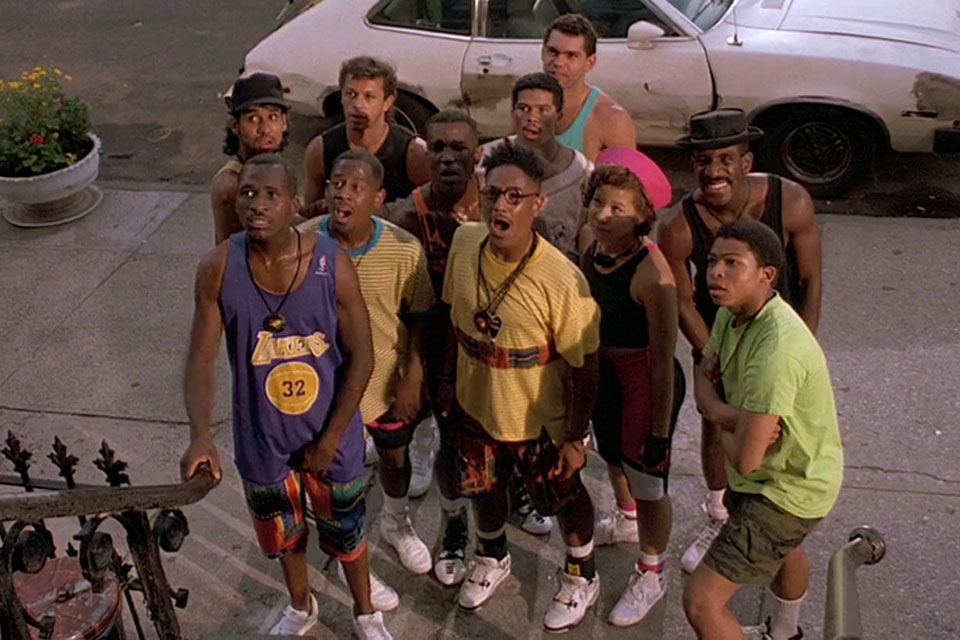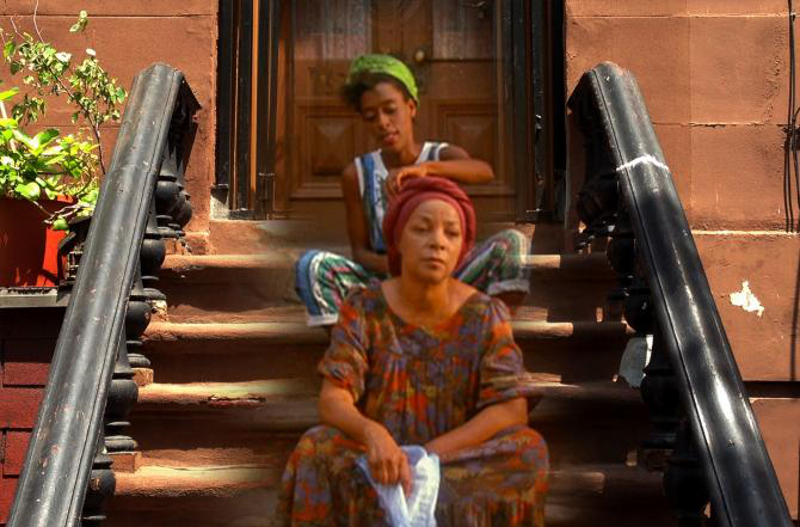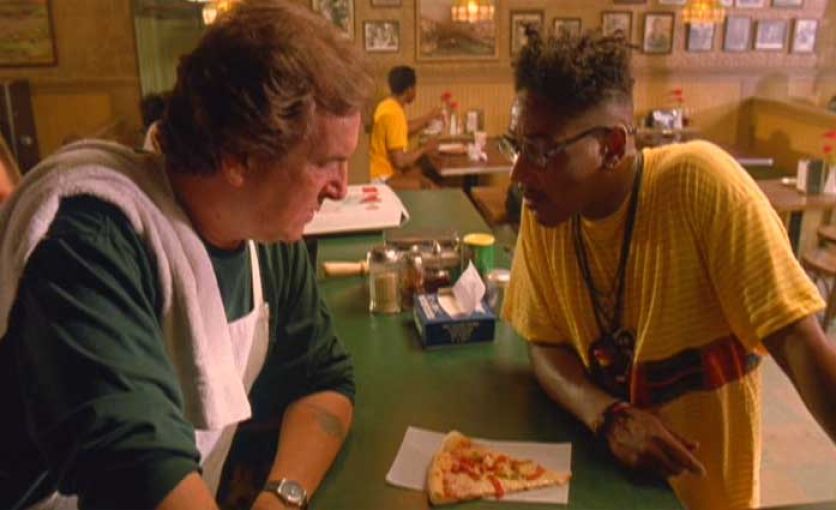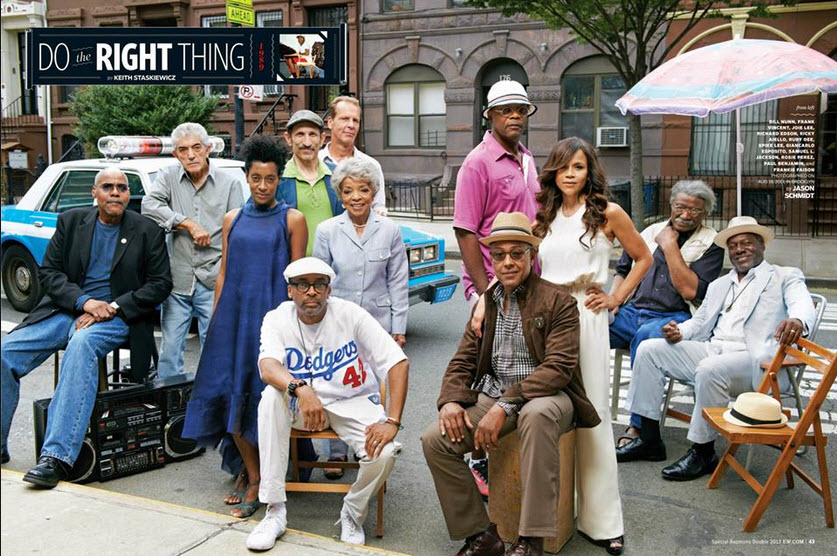
I call on Do The Right Thing out of curiosity. I bend over it out of a passion for Spike Lee’s insight into the persistent color line in the twenty-first century. For me, Mr. Spike Lee’s Do The Right Thing remains, in my utmost conviction, his most politically charged film.
Not only because it brings to the fore a rebuttal of the media’s disservice to Tawana back in 87, or the light it sheds on the relevance or the lack thereof of black entrepreneurship – within the context of a racist socio-economic system – or the awareness it brings to police brutality on today’s Radio Raheems, but also because of the fact that it uniquely illuminates the discourse on the limited successes achieved in building the unified front necessary for defeating racism.
The split in Do The Right Thing may be obvious. To many of us, Smiley’s picture of Malcom X and Martin Luther King still remains the two ‘very’ different approaches to attaining equality in America. Spike Lee kept nagging us at every turn with it.
But I think in its overarching discussion we lose sight of yet another important contribution from Mister Lee – that of the difference, the split – in our experiences with racism, or of our contact with the white man, Sal, depending on whether we are men or women, and how that split can also affect our approach to fighting inequality.

Do black women experience racism differently from black men? I place DO The Right Thing at the center, for one important point, to approach this side of the discussion on black people’s experiences which is generally most difficult to grasp: the differences in how black women and men experience racism.
In this case, I am dealing with how Spike Lee’s black male characters interacted with Sal (Danny Aiello) and how that was qualitatively different from Sal’s relationship with Jade (Joie Lee).
In order to recall parts in Do The Right Thing, I briefly recount some of its most striking features in relation to our discussion. I list some instances where black men interact with white privilege (Sal), and I stress that this is in no way an exhaustive citation.
First, Mookie (Spike Lee) works delivering pizzas for Sal’s Famous, a local pizzeria. Having failed to get his sons to clean up that morning, Sal rather orders Mookie to do the sweeping, to which he grudgingly disregards.
But Da Mayor (Ossie Davis) happily offers to clean up for peanuts – something even Pino (John Turturro), finds issue with, since for him, even the peanuts is too much money for the Da Mayor.
Second, our introduction to Sal and Buggin’ Out (Giancarlo Esposito) is one that steps up the intensity between Sal and his interaction with black men. While eating a slice at Sal’s, Buggin’ Out questions Sal about the “Wall of Fame” and demands he put up some pictures of Black celebrities (or as he puts it, “brothers”) up on the wall, since, he explains, Sal’s pizzeria is in a Black neighborhood and sells pizza to Black people. Sal replies that it is his store and he threatens to bash Bugging’ Out’s head with a baseball bat.
Later that day, Sal confronts another black man, Radio Raheem – the third instance – for blasting his boombox in the pizzeria. And then Mookie and Pino begin arguing over which race is better, Blacks or Italians, which leads to a series of scenes in which the characters, addressing the camera, spew a variety of racial insults.
In contrast to his interaction with these black men, Sal’s relations with Jade is a bit baffling, but different. Though some have argued it was harmless, it was nonetheless displeasing to her brother, Mookie and to Pino, probably because they were not accustomed to it, or rather, they didn’t like it. When Jade asks what’s good? Sal replies:
Everything, but for you I’m gonna make something special. Take a seat. There, that’s a clean table.
Later on, Sal sits at a table talking to Jade as she finishes her “special” slice. I don’t think it will be far-fetched if I borrowed Spike Lee’s way of describing Sal’s attitude towards Jade: “Vito, Pino, and Mookie look on, watching Sal have the time of his life.”
Now, Spike Lee may have been seriously short-sighted for his portrayal of how different this one black woman’s interaction with Sal – except for Ella (Christa Rivers) – was different from his interaction with black men.
No other black woman had any real contact with Sal. This is yet one of the script’s limitations if indeed the neighborhood grew up on Sal’s pizza. It is a perspective that, say a black woman director, could have brought to the table, however.
Nonetheless, Jade herself found nothing wrong with Sal’s attitude towards her – I mean, if it earned her a clean table and a ‘special’ pizza, why not? What may have been problematic, at least for me, is how she failed to see the difference between how Sal treated her, and the way he interacted with the rest of the neighborhood black men. To this end, our learned socialization between men and women may play a part.

But suffice it to say that Mookie reacted to Jade’s relations with Sal for a myriad of reasons.
First, as siblings he’s protective of her. Second, and if Tawana told the truth, Jade is a black woman and the historical context of white men’s relations with black women is painfully clear.
The other reason, central to the theme here, is the acknowledgement of the qualitative difference in white men’s attitudes towards black women (Jade), which can be read in Do The Right Thing as more benign than their attitudes towards black men, which is portrayed as more confrontational. One oftentimes results in a clean table and a ‘special’ pizza, while the other results frequently in either of two things – the gallows or death.
It is no longer surprising then – the result – when in the closing scenes, Radio Raheem (Bill Nunn), Smiley and Buggin’ Out demand that Sal change the pictures on the wall. Radio Raheem’s blaring boombox cascades into a fit of frustration and anger for Sal.
He calls Radio Raheem a “nigger,” then snaps and destroys Radio Raheem’s boombox with a baseball bat. Radio Raheem attacks Sal, which eventually ends in three white cops killing Radio Raheem to protect Sal and his establishment.
Is there a difference between black women and men’s interaction with white privilege, white men, the law, etc.? Within this context, the answer may be clear but can we extrapolate any such conclusions from Spike Lee’s Do The Right Thing into a general discussion of our experiences in America?
As of 2004, more African American men were disenfranchised (due to felon disenfranchisement laws) than in 1870, a decade before the Civil War began. If you take into account prisoners, a large majority of Black men in some urban areas have been labeled felons for life.
In Chicago alone, the figure is nearly 80 percent. They are denied the right to vote, excluded from juries automatically, and legally discriminated against in employment, housing, access to education, and public benefits, much as their grandparents and great grandparents were during the Jim Crow era (Michelle Alexander).
Though black women’s incarceration rates have also skyrocketed in more recent times (the implications of which will soon be transparent), the reality of the contrast between the independent black woman’s achievement and that of the black man in America is unquestionable and the gap between them has widened.
What is the black woman doing right? Do The Right Thing may in no way be an exhaustive piece, but it summarizes, perhaps, the nature of the black male experience, exemplifying the frustration and the lack of opportunity in America attendant upon him mainly through the confrontation and aggression he faces from the recurring white man’s bat.
Thus, this may be another explanation, at the very least, or the reason for the stunted growth and development of the black man in America. It may yet stand at the heels of the black woman (Jade) who is overly critical of the black man’s (Mookie’s) attitude – lacking in ambition and seriousness – as the main obstacle to his economic and social empowerment.
Hence, is it even possible for Jade to reconsider that, what is holding Mookie back may not be his lack of seriousness or the lack thereof of any ambition, but rather, Sal’s Pizzeria? That in order to see Mookie pay his rent, Taxation Without Representation, must go away? That until some brothers and sisters go up on that Wall Of Fame, Mookie ain’t gonna be able to pay his rent ever?
But violence only begets violence and it is in no way an expedient or even practical solution, but smiling from cheek to cheek hasn’t gotten the black man to the Promised Land either. Consequently, the black man is left standstill, uncomfortably caught within the crevice that these two opposing and unrewarding approaches have left him. Could this frustration be manifested in the three men burning away time by the street corner?
In the absence of any strategy from our perspective, isn’t it only pragmatic that the one hope the black man may yet have is the black woman? But where has she been when 80 percent of her sons are incarcerated in Chicago? Why hasn’t she occupied ‘The Chicago Square’ yet? I hope these sincere questions do not make the black man the black woman’s burden. But then again, whose burden should he be?
This is where the chickens come home to roost, perhaps. If the black woman (Jade) believes that the black man (Mookie) is the reason for his own downfall, then isn’t it easy to shirk the motherly and sisterly responsibility? This is evident when she threatens to kick him out next time he is short on rent.
Like Abuku has intimated, may it be worthwhile for us to realize that these black men were sons and brothers first before they became husbands and boyfriends? With this trend, how can the future generation of our sons become responsible if we cannot be responsible for them today?
When Buggin’ Out attempted to start a protest over the “Wall of Fame,” the Wall of Taxation Without Representation, no one supported his protest except Radio Raheem and Smiley (Roger Guenveur Smith). Mookie probably couldn’t because that was his place of work.
Could Da Mayor join? Or Jade, the school teacher – the more matured and highly educated one – who knows better how to organize a peaceful boycott, than the clumsy and uneducated Buggin’ Out? To what end have the sacrifices made in reaching a formidable percentage of educated black women served the African American community in the twenty-first century?
You should find a more useful way to spend your time. ~ Jade
The reason why I bring up the question as to whether there is a difference between black women and men’s perception/experiences with racism or interaction with the white man (Sal) lies at the heart of any possibility of harnessing the resources of the many independent black women out there towards building a united front in defeating racism. Undoubtedly, the guy with the microphone, the jersey and the chalk is equally implicated.
Did I start from a premise that men and women of African descent are not equally vested in ‘fighting the powers’ that keep a tight lid on the growth and development of African Americans in this country? No. However, what I bring attention to is that if in general, admitting some limitations here, black women and men perceive racism differently, then it is prudent to admit that the fight to full realization of the African’s potential in fighting for equality in American can be grossly undermined.
To this end I still beg the more notorious question: do black men suffer more racism than black women? Do black women believe that if the “nigger” worked a little harder he would make it?

Again, I confess that often when these debates are raised, it gets a little uncomfortable, due to the intrinsic nature of the qualitative differences. Admitting any differences in how black men and women perceive/experience racism is difficult since the propensity to quantify it can hardly be curbed. How much more racism exactly do black men suffer? Nobody wants to go there and neither do I, needless to say that the discussion does not have to go there.
For that matter, through fashion and perhaps hoping for the better, we often think that the question can be spared, or degraded to a subordinate position. All discrimination is bad – no form of it is tolerable – and this is where I think we need to be careful.
Almost all debates owe something to dilettantes, often very valuable viewpoints. But I agree that dilettantism, as a leading principle in discussions like this will be the end of valuable debate. Nothing will be farther from the intent of a thoroughly serious study than such an attitude.
The question of the relative difference in how black men and women experience racism, which I compare here is entirely limited to Do The Right Thing, but from which I make a huge extrapolation. In good faith, these extensions are only in regard to arriving at a kind of sincerity.
The path of our destiny as black people in America cannot but appall him who surveys only a section of it. And I might do well to keep this commentary to myself unless of course I was called to give them expression in artistic or prophetic form like Mister Spike Lee, MLK or Malcom X himself.
In ending however, the voluminous talk about discrimination in its most general terms does nothing but conceal a lack of perspective towards racism and the unique manifestations of it in the black man’s world, which merits as close a judgment as a similar lack of perspective towards all disenfranchised peoples in the world.










I never thought about this question but now that you bring it up it makes sense why I have different reactions to Sal than many others, some of them women, who I watched the film with. I couldn’t stand Sal, the way he looked at Jade like he was hers to take, or how he instigated and escalated beef with Radio Raheem and Buggin Out. But other people say Sal’s a nice guy or those men didn’t respect his place of business. I guess I look at it like that’s me on the other end – either in Radio Raheem or Buggin Out and that makes me uneasy about giving Sal’s “good-intentioned” business any credit or excusing his aggressive behavior.
But on the other hand, I wish we had seen Sal interact with more women so that Jade isn’t our only example of black women’s experiences.
michelle william’s research is even clearer! you seem to be careful abt the topic since you don’t want to step on feminist toes. but there’s something going on that’s causing black men to totally become America’s under caste! there’s something going on, and it’s not good, its not fair and either we all confront it by asking these questions and seeking honest answers or we watch our men die of. simple as that.
This kind of questions only create division. i think.
Man! we’re already divided man. Black men continue to be irresponsible/lazy/unambitious call it what you want, and black women complain and still don’t wonna fight the system for us etc. man all this bu**sh*t. We better start doing some real talking. thanks for bringin it up this way. It has more to do with life than film though… ma 2 $ .00
At first I thought this was going to be racially sexist. Well, I thought you are making an important contribution. It is difficult to talk about these things maybe but we have to do it I guess.
am very surprised by the statistics on black male incarceration. It’s a disaster. But where have black women been? We’ve had it hard too bro! But, jokes aside, we could do a little more than we are doing now.
Only we have to be careful about the question: certainly, you agree that black women don’t suffer less racism – what both black men and women go through are qualitatively different.
I know this is late but I had to say what came to my mind. I think it is not only the quality of racism that differs between black men and women but also the reactions to racism. As a young black woman I can honestly say that I never felt discriminated by men of any color but I have been underestimated by almost every creed of men. I do not speak for others but as an example, when someone tells me I can’t do something or that they will not allow me to do something it has a tendency to make me lose my temper. I however, do not express my anger immediately with hateful or angry words and actions. I was taught to kill them with kindness and that if God wants me to have something than no one on this earth can stop me from having it. So the word no has meant almost nothing to me. As Abuku stated Neither of them should allow their potentiality for self-determination controlled and predetermined by another.